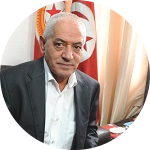I grew up working for a union organisation.
Our main concern was always to bring together unions and social elements in our country. We’ve been through ups and downs, and economic problems.
By comparing our situation with that of other countries, which experienced tensions and crises, we could foresee the dangers that could create internal divisions.
We learnt from others that after war and conflict, dialogue is necessary.
After the revolution we had serious conflicts and conflicting ideologies. It started with verbal insults and it when on to include political assassinations. We were deeply concerned by this situation and the way it was developing.
We understood that if we allowed violence to take over it would soon become extremely serious for our small country.
We have to learn from history and we need to forecast danger.
We saw that there were a lot of conflicts and serious differences splitting political parties. They were all sticking to radical intransigent positions and they were not looking out for the general interest.
There were certain attempts made to bring about integration but they failed. We decided, as a union movement, to shoulder our responsibilities. We considered there had to be one independent neutral party and that party should be worthy of everyone’s trust.
We discussed the situation within our unions and we produced a road map. We brought in civil society organisations and we spoke to political parties.
We told them quite frankly that they were fighting just to control the country and it’s people.
We also said there was a risk, for whoever would win, to find itself at the head of a country that does not have the minimum conditions to survive.
We encountered difficulties, but finally we were able to move beyond ideological and political conflicts. The consensus started to spread gradually – to the point that we managed to bring to the table all the political parties in the country.
We reached a conclusion involving the adoption of a constitution. We were able to establish institutions such as the independent commission for the organisation of elections.
Dialogue has to exist in order to govern countries. Wars and confrontation only lead to disaster but, as history has shown, they always end in dialogue.
What we did was to ensure that the dialogue in Tunisia preceded the conflict and anticipated conflicts and violence.
With the acceptance of our role we managed the dialogue, which led to a way out of conflict.
We exist in a troubled region where we don’t yet have forces with the political space to engage in dialogue and bring about peace.
But I am convinced that if we pool together our efforts, unions and civil society have a major role to play. That is something I deeply believe.
If this can happen, we can avoid major catastrophes in order to promote peace throughout the world.
Dialogue is essential. It is the only way to put an end to situations of conflict.
Otherwise there will be particular interests that will push conflict. Some forces will encourage civil wars and militias and will provide them with the means to act.
There are governments, which claim that they want democracy but at the same time they encourage and assist terrorist bodies. To bring peace to the world is not an easy task because this depends on social justice.
The choice made by the Norwegian Nobel Committee, when it honoured the role of the unions in achieving stability and in promoting the solution of peace throughout the world, recognised the importance of social diaologue.
For some time, we will be in the spotlight and we will try and use this to focus on the serious problems that concern us.
Firstly, we have a serious concern for refugees and those fleeing countries.
Secondly, and as a matter of urgency, we need to find a humanitarian solution to the wars in Syria, Lebanon, Iraq and beyond, and find a way to eliminate the causes of these conflicts.
We must put an end to the delivery of weapons to barbarian militias that have transformed entire countries into theatres of war, with the aim of halting democratisation.
Thirdly, we need to condemn the laws adopted in Gulf countries, which limit freedoms and infringe on workers’ rights.
A better world is possible, especially if we can reconcile economic and social interests.
Let us hope that we can move towards peace in all countries.
Let us act to ensure that unions have a role to play, and that it has to be done through dialogue.









